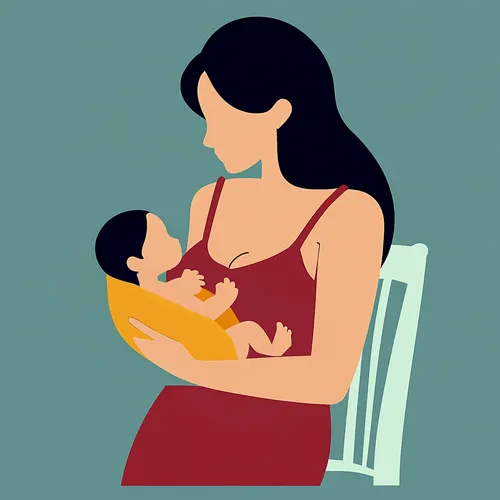Having a baby is seen as a happy time full of hugs and baby noises. But for many new parents, it’s not that simple. Let’s explore the world of postnatal depression (PND) that people often don’t understand and learn more about this common, but tough condition.
The Baby Blues vs. Postnatal Depression: How Are They Different?
You’ve just had a baby, and now you feel weepy, irritable, and overwhelmed. Don’t worry! This emotional rollercoaster, called the “baby blues,” is normal and lasts a couple of weeks. Your body is adjusting to the big hormone changes that happen after childbirth.
But what if those feelings stick around? That’s when postnatal depression comes into play. PND is like the baby blues’ stubborn uninvited relative. It can appear weeks or even months after birth hanging around much longer than you’d want and making it hard to look after your baby or handle daily life.
Spotting the Signs: When the Blues Turn Dark
PND isn’t just about feeling blue. It’s a tricky thing that shows up in different ways. You might notice:
- You feel stuck in a never-ending cloud of sadness
- You lash out at your partner for small stuff
- You find it hard to connect with your baby
- You can’t sleep at night even when your baby sleeps soundly
- You lose your appetite (or you eat everything you see)
- You deal with worry that seems to take over
If you’re saying “yes” to any of these, don’t keep quiet. Talk to your doctor or midwife – they want to help, not judge you.
The PND Puzzle: Why Does It Happen?
Wouldn’t it be great if we could pinpoint one clear cause of PND? , it’s not that straightforward. Becoming a parent feels like someone threw you into the deep end of a pool – it’s exciting, but also scary. Throw in lack of sleep, your body healing after giving birth, and the stress to be the “ideal” parent, and it’s no surprise some of us find it hard to keep our heads above water.
A few things might make you more likely to get PND:
- You’ve had depression or other mental health issues before
- You’re having problems in your relationship or don’t have much support
- Your pregnancy was tough or you had a scary birth experience
- You’re worried about money
- You’ve had PND in the past
Keep in mind: PND doesn’t choose its victims. It can hit anyone, no matter their history or situation.
Speaking Up: Identifying PND
Here’s some good news: you don’t need to face this challenge by yourself. Your health team knows how to spot PND signs. They’ll check on you after you give birth asking about your emotional and physical state.
Tell them the truth – and be honest with yourself too. Saying you’re having a hard time doesn’t make you a bad parent. , it shows you’re courageous. Your doctor might give you a survey to fill out or even do some blood work to check if something else is causing your symptoms.
Light at the End of the Tunnel: Treating PND
Fighting PND can seem like a tough battle, but you have many ways to win this fight:
- Rely on Your Loved Ones: Ask for help. Let your partner handle night feeds, or ask a friend to watch the baby so you can take a nap.
- Find Your Tribe: Support groups can be a lifeline linking you with other parents who understand your struggles.
- Open Up: Therapy especially cognitive behavioral therapy (CBT), can provide you with effective ways to handle your thoughts and feelings.
- Think About Medication: For some, antidepressants can make a big difference. They’re not a cure-all, but they can help balance things out while you develop other coping methods.
Dads Get the Blues Too
Here’s something people often miss: postnatal depression isn’t just a “mom thing.” Dads can have it too if:
- They’ve had depression before
- Their partner struggles with PND
- They face money worries or relationship issues
If you’re a new dad feeling swamped, don’t shrug it off. Your mental health counts just as much as mom’s.
The Takeaway: You’re Not by Yourself
Postnatal depression can seem like a shadow over what should be a happy time. But keep this in mind: PND happens a lot, doctors can treat it, and it doesn’t make you who you are as a parent.
If you’re having a hard time, don’t hesitate to seek help. Open up to your partner, friends, or doctor. There’s nothing to be embarrassed about when you ask for support – it’s one of the most courageous steps you can take for yourself and your little one.
Being a parent is like a roller coaster, with highs and lows. With the right people backing you up, you’ll get through this tough patch and end up stronger. Remember, you’re already handling the most challenging job out there – raising a child. You’re doing great!
Photo “Postnatal Depression: A Guide for New Parents” by Anthony Cunningham for Zoom Health
Zoom Health is a leading UK supplier of Home Health Tests and Earplugs





